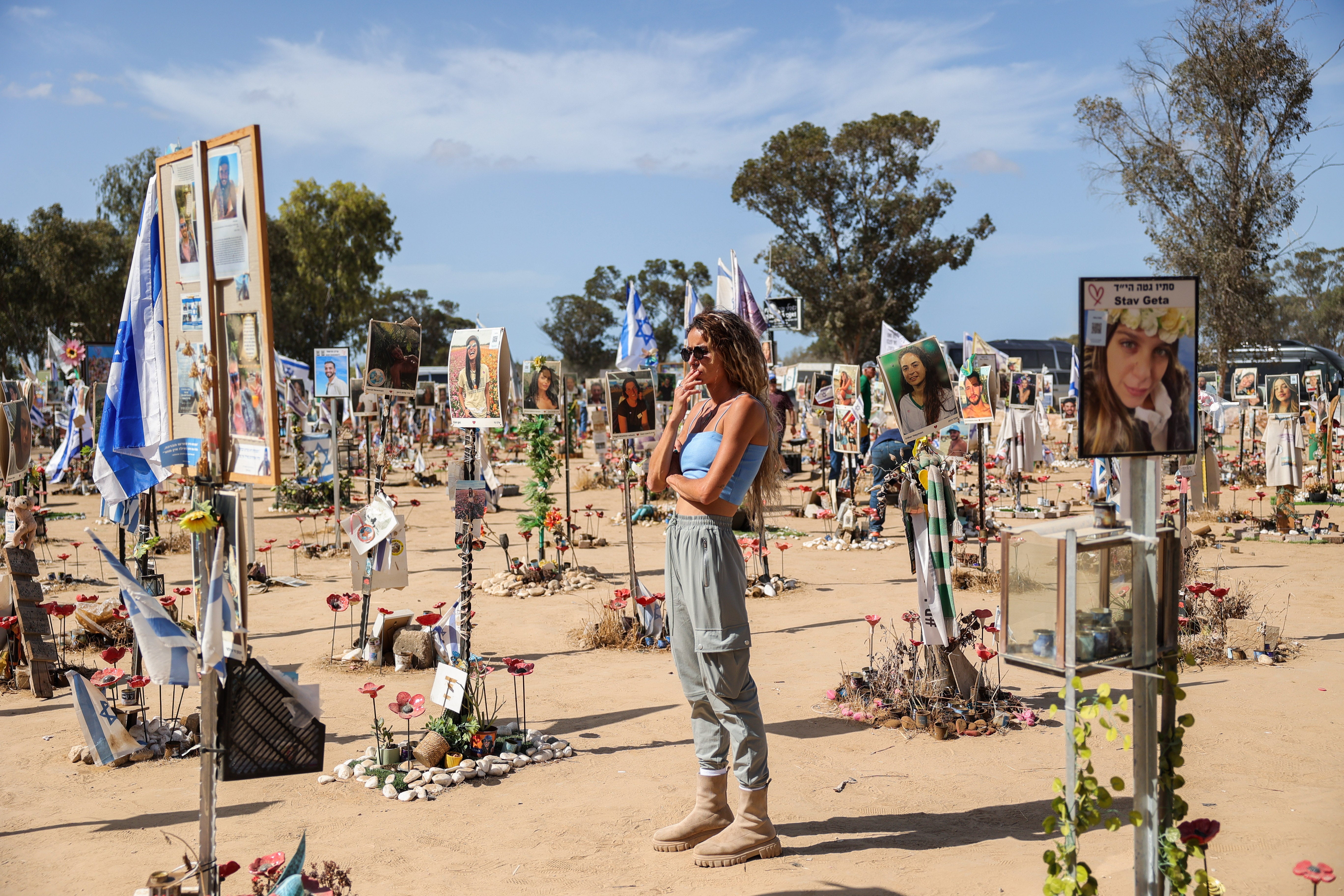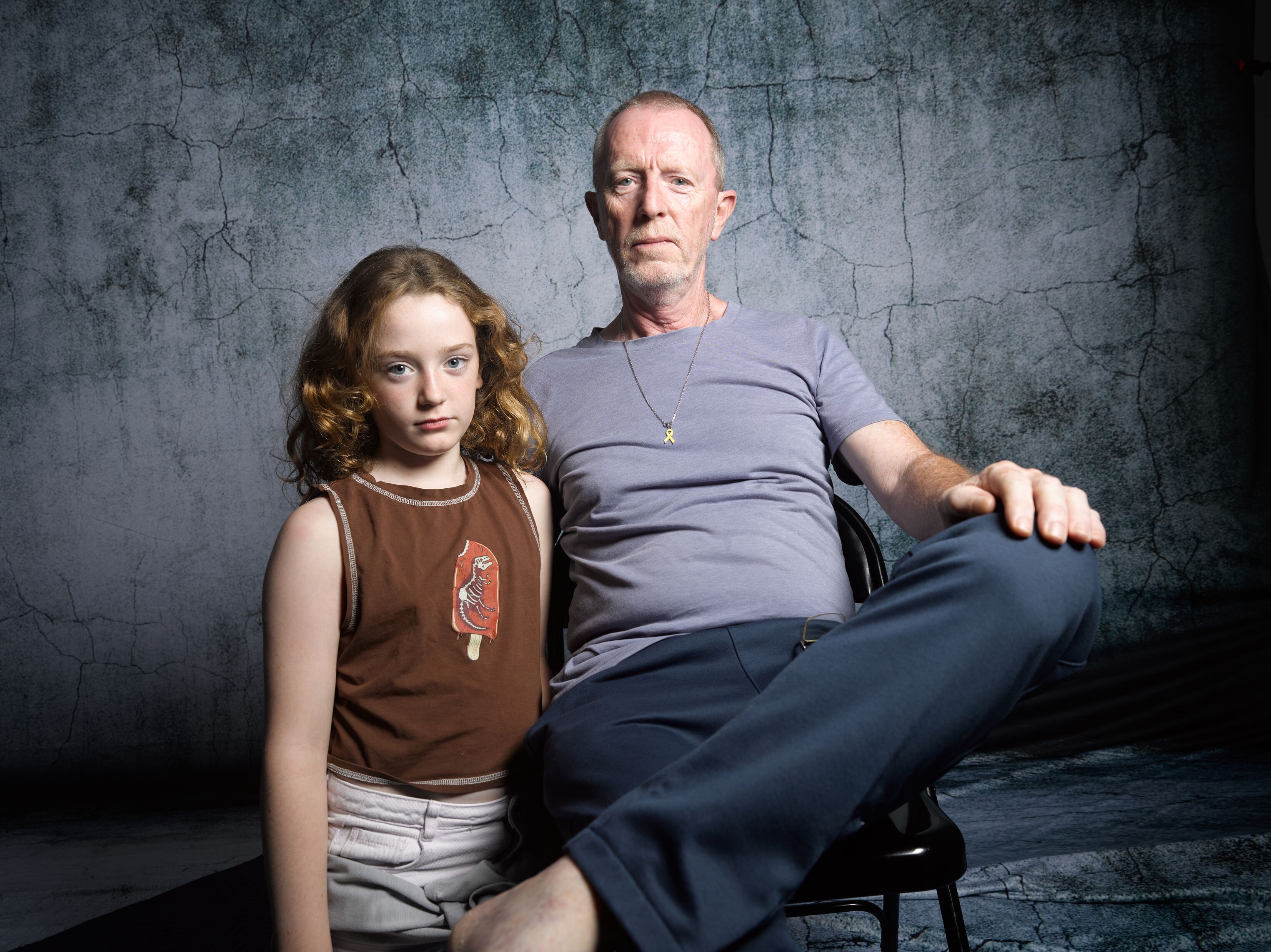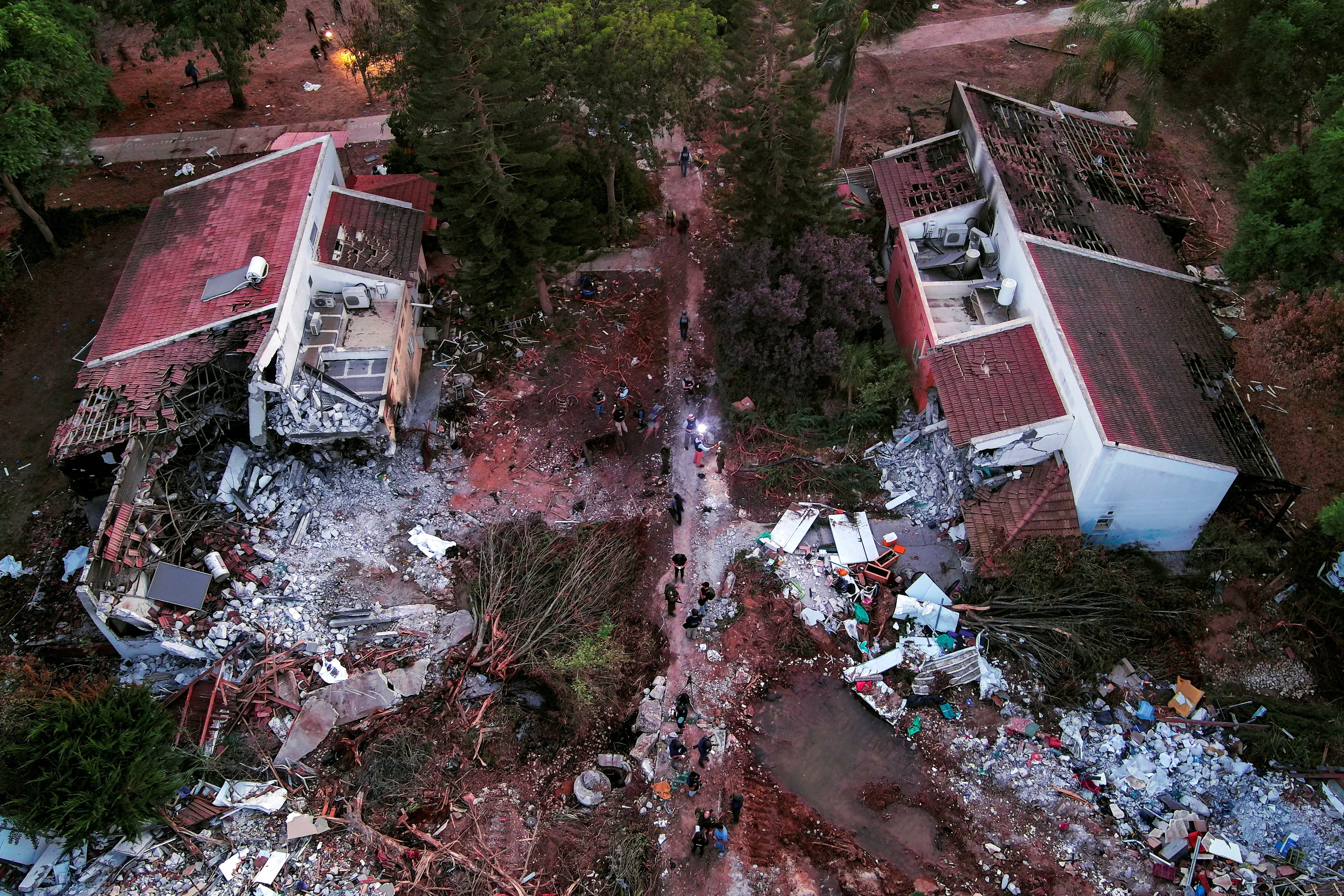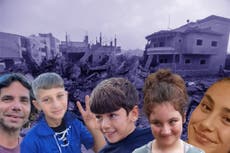October 7: The day horror came to the kibbutz
‘One Day in October’ follows the fates of 132 Israelis who were brutally murdered on Kibbutz Be’eri – just one of the many targets hit by Hamas on that terrible day. Documentary maker Dan Reed tells Guy Walters how after 12 months of bloodshed, the memory is fading for some, but why it is important to never forget what happened


We all know what happened a year ago in Israel – or at least we think we do. When we recall the multi-pronged Hamas attacks on 7 October, a horrific collage of gruesome images comes to mind. The idea of listing them seems lurid, almost grotesque – there is surely no need to endlessly replay them. But then perhaps there is. Ever since that day in which some 1,200 were killed, there has been a strange process of minimisation.
This has come in different forms, the most egregious being outright denial, with the conspiratorial claims that the attacks were either faked, or were false flag operations conducted by the Israelis to justify an assault on Gaza.
Then there is the suggestion that the attack was not mounted on that large a scale. This is quite simply not true, as there were terror assaults on at least 20 locations, and carried out by some 6,000 members of Hamas. To put that into perspective, that is more manpower than two brigades of the British Army. Furthermore, this suggestion of a small scale negates the estimated 4,000 to 5,000 rockets that were fired into Israel that day.
The final form of minimisation is more passive, and is perhaps the most common, and that is the act of partial forgetting. A year has gone by, during which so many other horrors have happened in the Middle East. Direct comparison between the number killed on 7 October, and the tens of thousands killed in Gaza is routinely made.
The implication of such a comparison is clear – the bigger the number, the bigger the crime. This, of course, is to evaluate morality with all the nuance of a football score. As the images of the horror dim in the mind’s eye, the massacres of that day are thought about in a more abstract form and there can be a tendency to not think about those numbers as actual people.
Those comfortable with this kind of minimisation will be made very uncomfortable by a documentary called One Day in October, which will be shown on Channel 4 on 9 October. Directed by Dan Reed, the critically acclaimed creator and producer of documentaries such as Leaving Neverland and Four Hours at the Capitol, the 90-minute film focuses on just one site – Kibbutz Be’eri – and tells the story of what happened that day with CCTV and mobile phone footage, WhatsApp calls, and even footage made by the Hamas attackers themselves.
The most powerful scenes, however, are the interviews with the survivors, who somehow manage to speak on camera about the most horrific events imaginable, including watching their own children being murdered.
Reed initially suspected that many of the inhabitants of Be’eri would be willing to be interviewed to tell the world what had happened. But he couldn’t have been more wrong.
“I’ve been making films and documentaries for 30 years now,” says Reed, “And I thought these people would be very willing to tell their story, and would be metaphorically queuing at the door. In the space of two weeks, I thought I would interview around 100 people.”
After his first visit to the kibbutz in November – just one month after the massacre in which 132 Israelis were killed there – he came back with just four interviews.

“The reason is obvious, in a way,” Reed acknowledges. “This is a community that’s been shattered. One minute, you’re enjoying an idyllic life. And the next minute, you’re in a room with your family with a door that won’t lock, and you’re waiting. You can hear your neighbours being murdered and kidnapped. And that goes on for hours and hours and hours. Their heads were not necessarily in the right place to talk to us.”
But over the course of several visits, Reed and his team built up enough trust to secure some interviews that make the documentary as extraordinarily moving as it is powerful. “The documentary maker’s secret weapon is listening,” says Dan. “And so, one by one, we built up a cohort of interviewees, and it took a long time.”
There were many reasons why the interviewees did decide to talk, one of which was a sense that the true horrors of that day had not been fully appreciated. Reed denies that they were making some sort of political point, and said that the motive often came from somewhere far more simple.
“I just think they were kind of saying, ‘Look, don’t forget about us’.”

For those who have looked on in horror as Israel pounded Gaza in the ensuing months and caused the death of tens of thousands of innocent people, it would be tempting to regard One Day in October as a propagandist attempt to justify what Netanyahu’s government has done, and continues to do in retaliation. The idea that his work would be misperceived as such is certainly something of which Reed is acutely aware of.
“October 7 is a pivotal day in history, whether you like it or not,” he says. “Certainly in the Middle East, possibly in the world, and this is what happened. This is not a set of generalisations, or slogans about the war. This is a very detailed story about a particular group of people who more than anyone else in the world know what October 7th meant. They’re the people who really know. The rest of us are just chit-chatting about it.”
“I understand that some people will say, ‘Oh, well, that’s the Israeli point of view, we shouldn’t be sharing that because of what they did later’. But on 7 October, you know, there was no Gaza being bombed at 6.30 in the morning.”
What happened that day in Be’eri was sadly typical of what happened at so many other kibbutzim. From around 7am, the settlement was attacked by well over 300 terrorists, who slaughtered more than 10 per cent of its population. What the film reveals is how long the inhabitants of Be’eri had to wait until help arrived, and that even when it did, it was either too small and ineffective, or would come in the form of literal overkill.
One of the most poignant moments is when a woman recounts the death of her husband in her arms, who had been killed when an Israeli tank fired at a house in which they were being held hostage.

Of course, Be’eri was just one site where massacres were taking place. The most notorious is the slaughter that was carried out at the Nova music festival, where 364 were killed and 40 kidnapped. But there were at least 11 other kibbutzim which were attacked, in which hundreds of others would be murdered. It is important to remember that what happened that day was an actual invasion, a full-scale assault on a country along a 25-mile front. It was not just a few terrorists on motorbikes “having a go”.
One of the other issues that Reed had to face was the whole question of how much violence he should show. The most distressing act seen in the film is when three young men are gunned down in their car outside the gates of the kibbutz, but that footage – vile and gruesome indeed – is not as shocking as some of the videos that exist of people begging for their lives and being killed in cold blood.
Reed says that he understood family sensitivities around showing such images and video, but he was nevertheless determined to show as much as he could without stepping into being lurid.
“It’s a fine line, but shocking material is justified if you understand why it's in the story,” he says. “And it forms part of a carefully developed narrative. It has meaning.
“When shocking images are just beamed at you and you don't know how they connect – you’re just seeing dismembered corpses, you’re seeing burned people, you’re seeing the most horrific things, and it’s all a mishmash.”

One of the elements of making this film that Reed found particularly affecting was walking around Be’eri itself.
“You’re walking through, crunching through the broken glass in people's homes,” he says. “You’re looking at their kids’ homework, scattered all over the floor, and their TV looks like a Salvador Dali painting because it melted in the fire. And you can just see the remnants of people suffering – their blood, their bloodstains – and you can see a bit of Hamas uniform with blood caked on it. It’s generally very, very grim and claustrophobic.”
It is vital he thinks that we, as citizens, really appreciate what violence entails, and that visual pixelation on screen can lead to a kind of “moral pixelation”, in which a sanitised and blurred version of the violence shields us from what has been done, and what can be done in our name.
“It’s vital for people to see this stuff, for real,” Reed asserts. “Because as democracies, we are occasionally tasked with making or helping to make decisions or electing governments that make decisions about going to war, or using violence in an organised way, or reacting to an attack. It’s important to understand what’s involved when that kind of force is applied to a human body. It’s a sort of good moral hygiene for people to be confronted with these things.”
Reed says that people are starting to return to what he describes as a “desperate and bleak place”, a settlement that looked like a prosperous American suburb. To do so, when you have seen your closest family members killed and heard your neighbours being killed and kidnapped, seems almost impossible.
But then perhaps there is no choice, because to walk away means that your enemy has beaten you forever. Worse still, people will minimise what happened to you, and ultimately, they will then forget.
‘One Day in October’ will be shown on Channel 4 on 9 October.
Want to watch One Day In October while travelling abroad? Then you'll need a VPN to stream this show. Discover the UK's best VPN deals today. Viewers using a VPN need to make sure that they comply with any local regulations where they are, and also with the terms of their service provider.



Bookmark popover
Removed from bookmarks